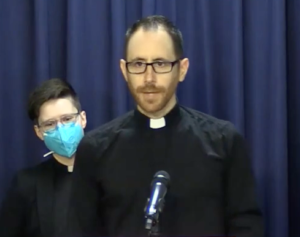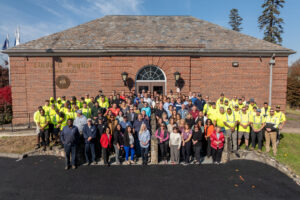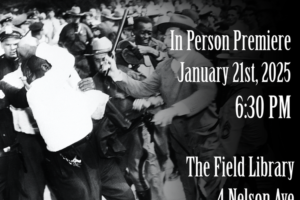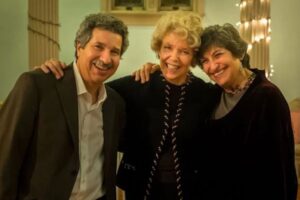
Rev. Joseph Paparone, the lead organizer with New York State’s Poor People’s Campaign and the Labor-Religion Coalition of New York State, will be the guest speaker at the Unitarian Universalist Congregation of the Hudson Valley in Croton-on-Hudson (2021 Albany Post Road 10520) on Martin Luther King Jr. Memorial Sunday, Jan. 15. Services begin at 10 am, followed immediately by a coffee hour. All are welcome.
The Poor People’s Campaign is a “National Call for Moral Revival”, launched by Rev. William Barber II and Rev. Dr. Liz Theoharis, with a focus to unite faith, labor, and community in a national movement for social, racial, and economic justice, grounded in deeply held moral and democratic values.
In a recent Zoom interview Rev. Paparone, who identifies himself as a Mennonite, of Irish/Sicilian descent, and a saxophone player, disclosed that he was raised in upstate New York but was greatly influenced by missionary work in Thailand and Cambodia where “I really saw this stark contrast of wealth and poverty, particularly the border of Thailand and in Cambodia. I was really exposed to these systemic problems in a new way that I then had to try and translate back to upstate New York right now.”
***
“In 2012 I start getting involved in every social action thing I could find. know, I wanted to work with faith communities on social justice. I was directed to a Catholic Worker community here in Albany, and the Labor Religion Coalition of New York State.”
“I would show up at their events and see all these faith leaders at the state capitol following a model that had been established in North Carolina, by Reverend William Barber called Moral Mondays and which was launched New York by by Reverend Barber and Reverend Lucille Harris out of Union Seminary.”
“They framed the issues in moral and justice terms, as contrasted with political horse trading. For example, a budget is a moral document. That’s not a it’s not a new idea, but it’s not always brought to the forefront in the halls of power and in the state capitol. So a budget, where your money goes, reflects what your values are.”
“And so we were trying to bring together not just people of faith and labor unions, but also community groups and breaking down the silos of these different issues. These things are interconnected. Since 2015 we continue to be involved in these different campaigns and supporting labor unions and worker justice struggles. The fight for 15 was a major campaign we were part of. But in 2017, we began looking ahead to what is now the Poor People’s Campaign a national call for moral revival.
On Martin Luther King Day. I expect to talk a about the history of the original Poor People’s Campaign, which was Dr. King’s last campaign. It represented a shift from of his thinking, from civil rights to human rights and a more expansive, multiracial coalition, and oriented around the poor of all races, geographies, and stripes. He also broadened his a understanding of interlocking oppressions, and evils, just a year before his assassination.”
***
“He spoke out against the war in Vietnam, and connected the militarism of that war and the country more broadly, to racism and to poverty. We’ve taken that up in the current Poor People’s Campaign, using that same analytical framework, we’ve added ecological devastation, and understand those as woven together in a in a sort of white Christian nationalism that upholds all of those oppressions. So I want to make some of those connections, obviously, and talk about that history, but then bring that forward to today.”
“I’ll certainly talk about the work that we’re doing in New York and nationally.Part of King’s vision of the original Poor People’s Campaign, was that the movement itself is a community of faith, and in order to pursue any dramatic social transformation you have to have some sort of trust in trusting the people, some sort of belief that this change is possible. Because, frankly, on a day to day basis, it, it often feels like we’re losing ground, and so there’s, there’s got to be some sort of motivator that says, I’m going to get up and keep keep at this. I’m going to keep working for justice, and we’re going to keep seeking to make this change. And people come to that in all sorts of different ways.”
“In the Poor People’s Campaign we’re accused of being a faith movement. And that’s not the case. But we understand faith is a powerful motivator for this kind of social change. We also recognize it as a space of contention in the United States today that it should not just be yielded to the remnants of the Moral Majority or, you know, whatever, that Christian nationalism, those forces that we should contend with that. So I frequently tell folks, you don’t need to be a person of faith to be part of this movement. But you need to understand how this is a space of contestation in which we’re struggling.”
***
“Another thing that I’ll hope to talk about our work today in New York. the New York State campaign has been organizing a poor people’s state of the state.. and Kathy Hochel, will be doing that on the 10th. But really, we could call it a state of the rich in New York State. Her analysis, even when they talk about the problems facing the housing crisis will be policies that will benefit the real estate industry, and not the poorest of the poor. Almost certainly, you know, she’s going to talk about rolling back bail reform, or, you know, public safety in ways that we know harm, poor working class communities the most. We need to counter by shifting the narrator, not simply lifting up the voices of the poor and dispossessed, but making sure that we say the plight, the fight and the insight of the poor and dispossessed are centered and understood that the poor know the solutions to the problems and that the leading force of social change.”
To that end, on MLK weekend, he continues, “we’re actually holding three events around the state. In Rochester, on the Saturday on Long Island on the Sunday, and then in Albany on Monday, advancing the analysis of what is poverty looking like in New York State today.”
“We’re propagandized that even though we’re not part of the ruling class, the 1%, they go to great lengths to make us think that we are. In Scott Fitzgerald’s “The Great Gatsby” he refers to us as “all distressed millionaires”. We don’t understand as ourselves as working class and challenging that misconception is a key piece of the the work and the campaign that I’m part of. We’ve been propagandized, conditioned to think that we’re some separate class from the poor. But the pandemic has been a remarkable ripping of the band aid. People who had jobs and health insurance, suddenly didn’t, millions of people lost that immediately. And so if you thought you were middle class, you were now cast into the ranks of the poor. Though many people have gotten jobs again, but they aren’t the same jobs. And we found the same process after the recession, and so folks in that middle class need to understand their overall position and kind of pick a side.”
***
“I think that there is that strata that has been able to, adjust to the pandemic in that way. But I think that when we listen and understand from the position of the most poor and dispossessed meaning they don’t have a stake, a real stake in the present structure. They have everything to gain from this structure being overturned. We could hear from folks in the National Union of the homeless, who would say, Well, how do you stay at home when you don’t have a home? What does it mean to isolate if you’re homeless? When if you live in New York City, the shelters take you out every day? Right? And then demand that you come back at a certain time, right, in certain ways. What does that mean?”
‘People at the top are fine. You know, they’re gonna keep making money. They’re gonna find other ways to. But it’s the working class, both the people providing directly providing health care and the people who need that health care, who are going to suffer. And I think you can look at that in so many different industries, any industry, especially that, frankly, shouldn’t be an industry, right, sure that we understand that human rights education is a human right, that we should not think of it as a as a market commodity that gets traded and exchanged similar with health care, housing and food.”
“Our Media Team will be putting together a video project in the immediate future. We have a report on poverty in New York State that will be released next week, just in advance. And so we’ll be doing a lot of promotion and sharing and speaking and organizing events around that. For me, in the capital region, we’re focused a lot on organizing health care and kind of uniting a lot of these different health care struggles. And so, you know, we’ll we’ll see what, probably the most pressing issues that the legislature decides to take up this this session. But I know fair pay for home care workers is going to be a big one, as well as the campaign for New York Health, which is a universal health care, and ending medical debt. “






